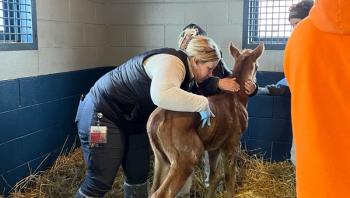
AVMA eyes key legislative initiatives for 2006
Washington ? The veterinary legislative agenda on Capitol Hill this year is nothing short of quot;aggressive," according to the American Veterinary Medical Association (AVMA).
WASHINGTON — The veterinary legislative agenda on Capitol Hill this year is nothing short of "aggressive," according to the American Veterinary Medical Association (AVMA).
"It's a mixture of hard science and economical benefits to the profession, including disaster relief and assistance," explains Dr. Michael Chaddock, director of the American Veterinary Medical Association's Governmental Relations Division.
This lobbying agenda is set by the AVMA Executive Board and prioritized by the AVMA's Legislative Advisory Committee.
Key bills before Congress include:
Skyrocketing health insurance
Small Business Health Fairness Act (HR525/S406) would allow small business associations to offer health insurance to members' employees. Currently, AVMA members cannot purchase AVMA's Group Health Life Insurance Trust for employees. Through this proposal, association members are allowed access to the plans in all 50 states. Seven states (Maine, Massachusetts, New Hampshire, New Jersey, North Dakota, Vermont and Washington) restrict access to group health insurance plans, AVMA reports.
The House of Representatives version of the bill passed last year. In the Senate, a similar piece of legislation has emerged dubbed The Health Insurance Marketplace Modernization and Affordability ACT of 2005 (S1955), AVMA says. Its chances for passage are favorable. The association is actively lobbying for changes to the wording of the bill to allow the association "to continue to offer member plans in addition to group plans for employees."
Shortages of veterinarians
Two pieces of legislation attempt to solve shortages of veterinarians in key sectors. The first: The Veterinary Workforce Expansion Act calls for major federal funding to build infrastructure for veterinary schools by creating a competitive-grants program (see related story). The goal is to recruit and train veterinarians to serve in public health roles.
The second piece of legislation is to continue to seek full funding for the National Veterinary Medical Services Act (P.L. 108-161). The law authorizes loan repayment program for veterinarians who practice0 in underserved areas. While the legislation passed in late 2003, it wasn't until last year that Congress appropriated a down-scaled $500,000 to start the program. AVMA reports that the United States Department of Agriculture is creating the rules for the program's administration. AVMA says it will keep pushing for full funding.
Horse slaughter
AVMA also wants to pursue the defeat of The Horse Slaughter Prevention Act (HR503, S1915) and related amendments to the FY06 Agriculture Appropriations bill. In the Senate, the legislation was introduced by veterinarian and Sen. John Ensign of Nevada.
He said in a house floor speech, "While horses in the United States are not raised for food, last year alone, almost 50,000 horses were slaughtered in the United States for human consumption abroad. Pet horses, ex-racing horses, workhorses and even some federally protected wild horses are currently being slaughtered for human consumption in Europe and Asia. A series of recent polls show that Americans overwhelmingly support a ban on the slaughter of horses for human consumption."
As an opponent to the bill, AVMA contends that a slaughter ban on horses would lead to a crisis since 65,000-100,000 equines would need alternative methods of care or disposal if euthanized.
Laboratory network
AVMA is pushing for full funding for the National Animal Health Laboratory Network. The network's primary responsibilities are to create a chain between existing diagnostic laboratories to report diseases "of national interest." The Association of Veterinary Laboratory Diagnosticians believes current funding levels are inadequate. AVMA reports it is actively pursuing funding increases for FY2007 at a level of $85 million for infrastructure and $30 million annually for operations.
Minor Use Office
Since the Minor Use & Minor Species Animal Health Act of 2004 became law, AVMA contends, the Food and Drug Administration office responsible for designating animal drugs in this category is woefully underfunded. The association supports increases to its funding base.
Newsletter
From exam room tips to practice management insights, get trusted veterinary news delivered straight to your inbox—subscribe to dvm360.





